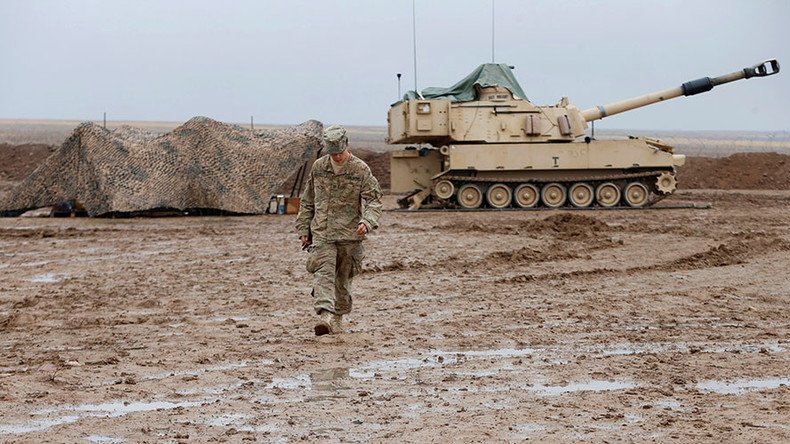‘US anti-ISIS Mosul operation will likely take an entire year’ – former Pentagon official

A recent report showing that US-led forces have killed almost 200 civilians in Syria and Iraq since its anti-Islamic State operations began indicates the offensive in Mosul will likely be a lengthy affair, former Pentagon official Michael Maloof told RT.
RT: We’ve seen a lot of claims coming from all sides alleging collateral damage from these operations. Is so-called collateral damage just an inescapable part of war now?
Michael Maloof: Well, yes. It is unfortunate but it is the reality. On both sides, as you pointed out. But the US is supposed to double-check and triple-check and make sure that there is no such thing as civilians in harm’s way. But given the reality on the ground there, it is the case. The problem that I am seeing is that when they talk about “not credible sources,” it basically means they don’t have enough information to determine whether or not there was actual collateral damage of civilians being killed. That really means we don’t have intelligence on the ground. We shouldn’t be bombing in areas where we lack good intelligence on the ground. And that has been one of the major problems, and especially since the rebels, for some time now, have integrated themselves in with the local population to shield themselves. And that is the reality of war, especially in an urban environment.
US-led coalition admits killing at least 188 civilians in Syria & Iraq https://t.co/tbsjscxcRm
— RT (@RT_com) January 2, 2017
RT: Is there anything in the timing of the publication of this report – January 2? Was Washington hoping the public might overlook it during the holiday season perhaps?
MM: Well, it’s always the case. Whenever they want something out that is controversial, they either do it on a Friday night or over a long holiday period, such as we’re going through right now. The report itself states there are 118 civilian deaths. This is totally unacceptable. I think they want to avoid having the mainstream media focus attention. I haven’t seen it on any mainstream media here in the US at all. So, it’s just come to be accepted. I might add that the Pentagon tends to regard an area that is very, very critical, as assuming that there will be certain amount of collateral damage. It is not their families, but it is innocent people who are being killed to hit a “high-value target,” as they call it.
RT: America’s top commander in Iraq expressed hope that the Mosul operation would be over relatively soon. Do you share his optimism?
'Mosul is the next Aleppo, Iraq's fight against ISIS will be decided there' (Op-Edge) https://t.co/03urbZZmxt
— RT (@RT_com) January 2, 2017
MM: Not at all. They are not in the city yet. They are only on the outskirts. They are maybe roughly about 30 miles out. They haven’t even penetrated the city, which still has more than a million people. That is going to be house to house, room to room, virtually. It probably will take all of next year. They anticipated that this thing would be over in a few weeks, and then it was going to be a few months. I think it is going to be almost a whole year if they can hold out, and if they have the stamina to deal with it. When you’re dealing with a city like that, where people are being held hostage, it is going to be very, very hard.
Plus, ISIS [Islamic State/ISIL] has a strategy in this case. They are going to go ahead and hit in other areas of the country, as they have in Baghdad just the last day or so. And this is to set the Iraqi military off balance. That is part of the strategy. It is going to make it much more difficult; it will cause the diversion of specialized forces to deal with these kinds of developments. Frankly, the Iraqi army doesn’t have enough trained soldiers for this kind of warfare. I don’t know what their longevity is going to be, but we’ve got to also wait for what the Trump administration plans to do about putting in forces. He could decide – I am not saying he will – to put in overwhelming forces and give US military a more active role. I don’t know. Certainly, the forces that we have there now are seeing combat frankly. There are sufficient numbers in order to really get the job effectively done.
The statements, views and opinions expressed in this column are solely those of the author and do not necessarily represent those of RT.












